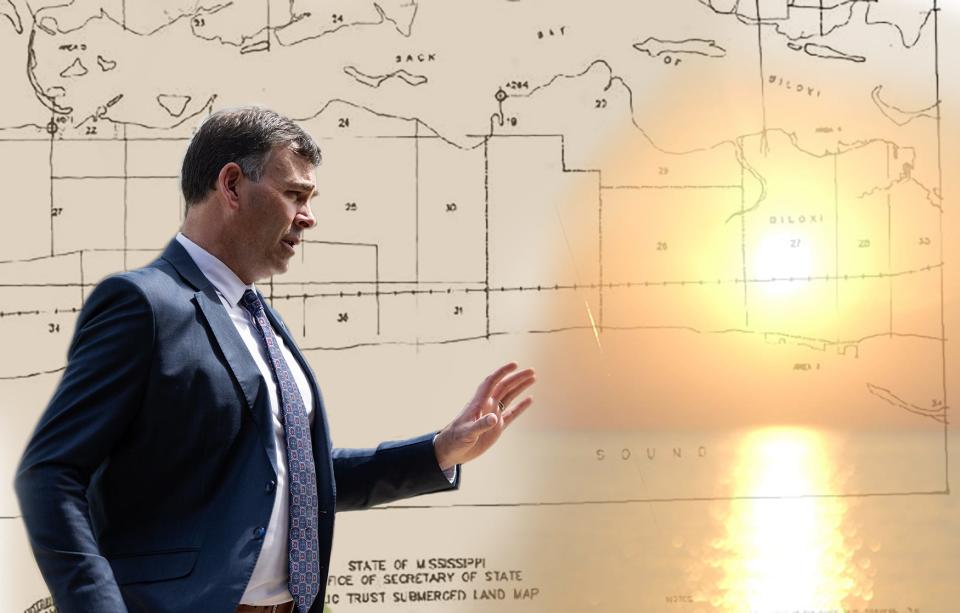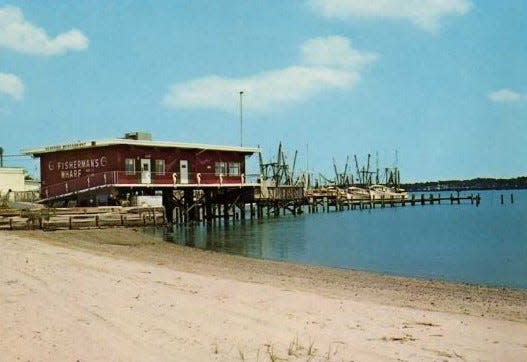How a Spanish land grant from the 1700s is affecting present-day Mississippi
The bloodshed of the American Revolution had just come to end. It was 1784, and with the signing of the Treaty of Paris months earlier, Britain had finally recognized the 13 colonies. It would be five years before George Washington became the first president and 15 years before Mississippi would even become a U.S. territory. Much of the present state remained under Spanish control.
Yet, developments of 1784 continue to influence and shape the Magnolia State, even in present day.
The Mississippi Supreme Court recently affirmed a Biloxi landowner's right to a disputed portion of land secured by the Spanish government in 1784. The decision is one that could throw the state's Tidelands Act into review.
In April, the court handed down a decision siding with John Aldrich over the Mississippi Secretary of State's Office in a case that spanned 26 years. That fight detailed disagreements over the tidelands map boundary, which stretches along the Mississippi coast, and the Aldrich's Biloxi property line south of Highway 90 that was established before the map was drawn.
The boundary is the line separating private land along the coast and public tidelands to which anyone has access. The boundary also protects the natural ecosystem of the coast from overdevelopment.
Throughout the case, Aldrich's family claimed it had right to its land that stretched beyond the tideland boundary, and MSOS argued the office had ownership as designated through the map and the Legislature.
However, in that case and several others, the court sided with private owners over the state. Secretary of State Michael Watson said if nothing is done to address concerns with private landowners and local municipalities challenging it, the tidelands his office is supposed to protect could be threatened even further.
"It's going to cause a lot of lawsuits," Watson said. "There needs to be balance, and I think that's the key piece with making sure that you've got a good piece of tidelands legislation that is very clear that the court can't come and say, 'Oh, well, wait a minute, maybe we've got an angle here to blow it up.'"
Watson and other coastal lawmakers said their goal this past session was to address the liability of the tidelands map through Senate Bill 2780. That bill would have codified the map in state law and given more authority to local municipalities regarding local harbors. It also required any casino projects along the coast to obtain a public tidelands lease from MSOS.
Part of those reasons are why, Sen. Mike Thompson, R-Gulfport, said, the Aldrich case and several like it were related to economic development of those properties for casinos and local revenue creation. With SB 2780, he said, the state would at least have some clearer guidelines about casino projects on tidelands to avoid future lawsuits.
Could Jackson water have had more help? MSDH could have, but didn't subsidize $12.8 million in loans for Jackson Water System

“Our goal was to address some of the issues between the Tidelands and the Gaming Control Act, and some issues that the court cases have pointed out," bill sponsor Thompson said.
For example, the City of Biloxi became a defendant in the Aldrich case because it sought to collect tax revenues from any future development, according to court records. After the case was decided, the Tullis Gardens Hotel, LLC announced it is moving forward with plans to develop the Aldrich property as part of a $300 million hotel-casino project.
To build a casino on the Coast requires control of the site to near the water’s edge. To accomplish that, Tullis wanted to include the Aldrich property, which previously was home to a casino, directly across the street from the proposed Tullis resort, according to reporting by the Sun Herald.
Tullis executives declined to comment on this story.
“The city of Biloxi has made a claim (in court) over the past 10 to 12 years, that if gaming operations generate public trust tidelands lease revenues in the city of Biloxi, that the city of Biloxi should receive a very large or proportionate share of revenues," Sen. Scott Delano, R-Biloxi, said of the lawsuit and the city’s actions.Cree Cantrell, the Biloxi Businessmen’s’ Club president, who wrote letters supporting the Aldrich’s side, disagreed with Delano and said the business community and city simply want to promote economic growth.
“Anytime the courts rule in the favor of property owners and development in Biloxi, we're very much in favor of that. We applaud that," Cantrell said.
John Aldrich, the owner of the property, did not respond to requests for an interview.
What is the Tidelands Act?
Changes coming to MS statues in DC? Republicans join effort to change confederate statues representing MS in Washington
In 1989, the Legislature passed the Tidelands Act and established a public trust for tideland money for funding public projects along the coast. Those revenues would be generated through tideland leases, which are approved and regulated by MSOS.
It also designated MSOS to create the tidelands boundary.
However, the map was not made until 1994. According to the Supreme Court, MSOS didn't utilize updated land surveys, instead using ones from the 1800s, causing the boundary to fall further north.
That included the Aldrich family lot, which was once home to the Fisherman’s Wharf Restaurant, a popular town eatery throughout the 1900s and then the Lady Luck Casino, which opened in the 1990s and closed in 1998.

Once MSOS informed the Aldrich family it violated the boundary, they challenged it in chancery court in 1998, claiming they owned the full lot that was established in 1784 by the Spanish government. The case sat mostly empty with small actions until 2022 when the court found that John Aldrich, the head of the family, had right to the section of land. After Watson appealed the decision, the Supreme Court upheld the ruling.
Watson added that a component of the Tidelands Act undone by the case was a way for people to challenge the boundary or obtain a tidelands lease. Now, every dispute will likely end up in court.
Thompson and Watson both said that fact is part of the reason SB 2780 failed, which they believe was caused by law firms aiming to benefit from litigating against the state on the Tidelands Act rather than having new laws.

"It's almost like it's bringing us back to (before the Tidelands Act was established), and you're going to have all these cases again where a lot of lawyers will make a lot of money," Watson said.
What happens with the tidelands map now?
Watson said he hopes to begin interviewing people on the coast about the tidelands map and see where changes might be made. While he did not say what legislation he will push for in 2025, this issue will be a sticking point for him.
Delano said he would be open to reviewing the tidelands map for possible amendments to avoid future lawsuits against the state, and Thompson is aiming to try and codify the tidelands map again next year.
Grant McLaughlin covers state government for the Clarion Ledger. He can be reached at gmclaughlin@gannett.com or 972-571-2335.
This article originally appeared on Mississippi Clarion Ledger: MS Supreme Court ruling upholds Spanish land grant, affecting border

